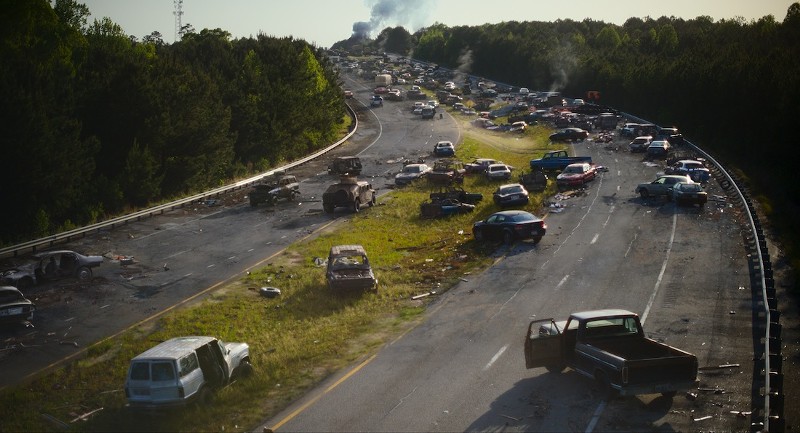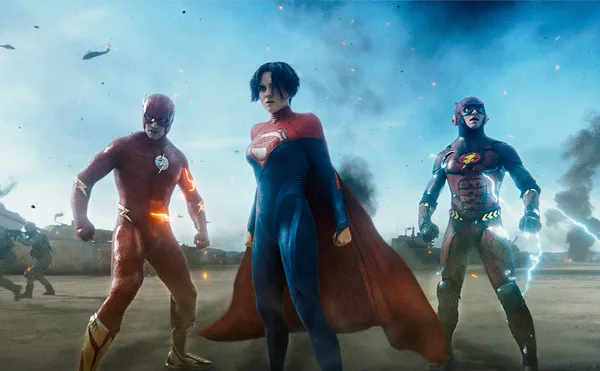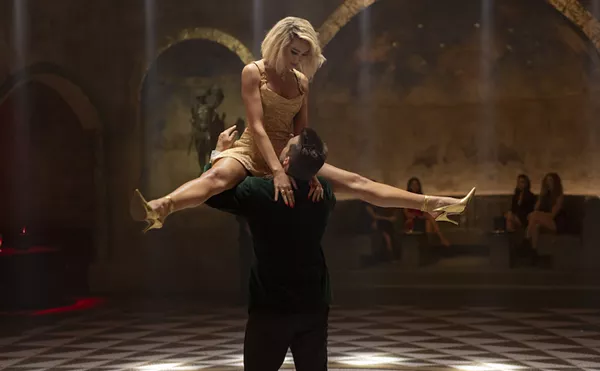Reflecting the division in the country whose internecine conflict it vividly depicts, Alex Garland’s Civil War splits unevenly in two, alternating brutally effective and disturbing sequences of violence with caesuras of conversation and uneasy respite. The former, with their amped-up urgency and ratcheting suspense, display an impressive filmmaking mastery, but the latter strive for a level of sociocultural insight that they regrettably never quite reach.
Garland deliberately withholds the backstory that would explain how a near-future U.S. descends into warring factions, and he provides only the barest hint of what’s transpiring in most of the country. We’re briskly informed that the Western Forces — an eyebrow-raising union between Texas and California — are making a final push toward Washington, D.C., with the federal government in imminent danger of collapse. Civil War implies that multiple groups (with perhaps opposing goals) are actually engaged in battle — a Florida Alliance is referenced, and armed, uniformed soldiers with unspecified affiliations and unknown intent periodically appear — but, again, Garland refuses to clarify, preferring to keep his audience lost in the fog of war.
Civil War unfolds over a few wildly eventful days, following a quartet of journalists as they set off from New York on a circuitous road trip to reach the capital before it falls. Writer Joel (Wagner Moura) and storied war photographer Lee (Kirsten Dunst), a reporting team from Reuters, are in pursuit of an interview with the president (Nick Offerman) — an ambition that seems, given the rapidly deteriorating situation and the administration’s enemy-of-the-people attitude toward the press, both impractical and suicidal. Joining the pair on the journey are aging New York Times reporter Sammy (Stephen McKinley Henderson) and aspiring freelance photojournalist Jessie (Cailee Spaeny), who provide, in somewhat pat fashion, the contrasting perspectives of the skeptical veteran and the wide-eyed naif.
As noted, Garland and cinematographer Rob Hardy — a longtime and essential collaborator — stage Civil War’s action sequences with stunning brio and verisimilitude, uncomfortably immersing us in chaos. The film features two adrenalizing battles in which the journalists embed with attacking troops. One is the climactic assault on the White House, but Civil War’s undeniable centerpiece is an agonizingly protracted confrontation with soldiers dumping a truckload of bodies into a mass grave. Shortly after the journalists encounter a pair of colleagues on the road, Jessie and one of the new arrivals are taken captive and threatened by this squad of apparent malefactors, and Lee and Joel attempt to negotiate their rescue.
Joel makes what seems an eminently reasonable argument: “There’s some kind of misunderstanding here. We’re American.” But the coolly menacing soldier who interrogates them (an extraordinary but unbilled Jesse Plemons) remains unmoved and even amused. Balefully gazing at the journalists from behind disconcerting red sunglasses, he pointedly asks: “OK, what kind of American are you?” The reply to that maddeningly opaque, ultimately unanswerable question will determine life or death. It’s a scene that boils the film’s admonitory theme down to its essence: If we continue to turn up the heat to eliminate impurities, everything will evaporate, leaving nothing but the scorched-black bottom of a no longer usable melting pot.
Garland has said that he intends Civil War as a companion piece to Men (2022), which offers a critique of toxic masculinity and the ways in which one bad man births another (quite literally, in the film’s fantastical body-horror conclusion). Civil War is less abstract and metaphorically inclined than Men, but in its lack of grounding particulars, the movie wants to offer the same kind of universal message rather than limit its applicable lessons to the United States. Although I understand the impulse — our country is clearly not alone in sorting its occupants into us and them (red state and blue state, rural and urban, Black and white, patriot and traitor, immigrant and native-born, and on and on) — the sketchy nature of its world-building muddies interpretation. Most problematically, Civil War suggests that the president is a Trumpian autocrat — for example, it’s mentioned almost in passing that he’s serving a third term, which would indicate a defiance of the 22nd Amendment. Is the insurrection therefore an effort to restore democracy? If so, that would seriously complicate our attitude toward the rebels.
As much as I appreciate the film’s heroicizing of journalists — the media can certainly use the positive press! — Civil War also provides an oddly conflicted and almost cartoonish view of the profession. Lee laments that her celebrated combat-zone photography, which she hoped would harshly illuminate war’s devastating effects, had no persuasive impact on the current conflict. She appears weary, utterly defeated. What then is her purpose now? Is there value in her pictures beyond the aesthetic? Especially ludicrous is Lee and Joel’s pursuit of a presidential interview. Beyond the implausibility of securing an audience, what possible news do they think will result? And what would prompt a newbie photojournalist like Jessie to shoot on film rather than digitally in the midst of conflict? She would need a substantial supply of expensive, difficult-to-obtain film stock, and changing rolls under fire and on the run would seem a pointlessly high hurdle for a novice.
These complaints, however, don’t diminish Civil War’s legitimate ability to provoke. Garland says that he wants the film to prompt conversation, and by not making explicit what either side of the conflict represents, he perhaps allows for at least a tentative reach across the yawning divide. But even if we stay warily siloed in our respective bunkers, Civil War’s grim vision of a riven America provides a sobering look-what-can-happen warning. Sadly, like Lee’s photos, Garland’s film will no doubt prove ineffectual despite its considerable power. We’ll know as early as November.
Civil War
Written and directed by Alex Garland. Opens nationwide April 12.
Subscribe to Riverfront Times newsletters.
Follow us: Apple News | Google News | NewsBreak | Reddit | Instagram | Facebook | Twitter | Or sign up for our RSS Feed










